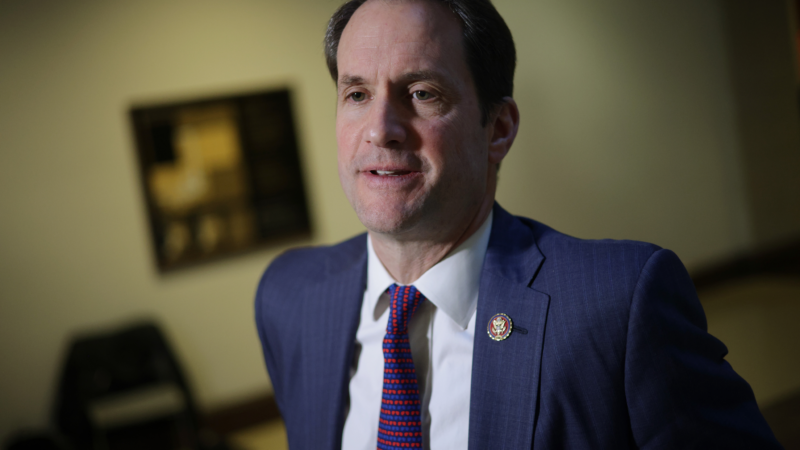‘An unbelievable cocktail of incompetence’: a U.S. representative on Signal messages
The Atlantic has published the text messages from a group chat on Signal, a messaging app, in which top U.S. defense and intelligence officials shared planned military airstrikes on Yemen targeting Iranian-backed Houthi rebels.
The incident is raising questions about the administration’s use of Signal, or apps in general, to discuss highly sensitive plans.
Rep. Jim Himes of Connecticut, the top Democrat on the House Intelligence Committee, told Morning Edition that the information shared in the text exchange should have been classified “at the highest levels.”
“This is just an unbelievable cocktail of incompetence and [an] awful handling of critical information,” Himes said.
Jeffrey Goldberg, editor-in-chief at The Atlantic and the journalist who received those messages, said he decided to release more messages today after several administration officials, including President Trump, Defense Secretary Pete Hegseth, and the Director of National Intelligence Tulsi Gabbard, asserted that Goldberg was lying and said no classified information was shared in the group chat.
Himes, who is questioning top defense and intelligence officials, again, during a House Intelligence committee hearing today, spoke to NPR’s Leila Fadel about the text exchange on Signal.
The following excerpt has been edited for length and clarity.
Interview highlights
Leila Fadel: Have you had a chance to review these texts that were just published in The Atlantic?
Jim Himes: I have, yeah. And needless to say, what we see this morning is inconsistent with what we were told by the intelligence community leaders yesterday and is just beyond the pale in terms of information that was put at risk.
Fadel: Reading these texts, I’m reading exact times, you know, “time now, weather is favorable, just confirmed with CENTCOM” – which is Central Command – “we are a go for mission launch,” and then times of bombings.
Is this something that would be typically classified?
Himes: Absolutely. Absolutely. And classified at the highest levels. And it’s not hard to understand why. Because if that information were to escape – were to be taken by the Russians or the Chinese, it could be instantly conveyed to the Houthis, who are actually pretty sophisticated.
And so how do the Houthis respond to that? Frankly, any enemy that is about to be attacked by the United States, that has given them warning because for three days officials have been putting the information up on Signal. So what happens? The Russians convey the information to the Houthis. The Houthis now know to move everybody, to move their equipment, to move their anti-aircraft equipment, to a place where they might be able to shoot down a pilot, where they might be able to sink a ship, because now they know when and with what the United States is going to attack.
So, I can’t think of many operational details or many bits of information that are quite so important to keep secret than what we just saw released by The Atlantic.
Fadel: CIA Director John Ratcliffe, National Intelligence [Director] Tulsi Gabbard – both were in that group chat. You will be questioning them later today. What are you going to ask them after seeing these texts?
Himes: It’s one of those questions [of] where to begin, right? I mean, with a screwup of this magnitude, there’s only one response, which is, ‘We are terribly sorry. We are standing down. We will do the investigations. We will get to the bottom of this. We will make sure it never happens again. And there will be accountability for the people who were involved.’
You know what we didn’t [hear] yesterday? A single one of those assertions. Instead, we saw attacks on Jeffrey Goldberg. And we saw, quite frankly – and this is a specific answer to your question – what appear to be at best, misstatements.
Director Patel, Director Gabbard were asked whether the conversation included information on weapons, packages, targets or timing. They said, ‘No, not that I’m aware of, no precise operational details.’ And of course, now we have the four significant figures in military time, exactly what time the FA teams are taking off and the fact that they will be accompanied by a MQ-9 Reaper drones. So I mean, again, where to start?
This is just an unbelievable cocktail of incompetence and [an] awful handling of critical information.
NPR disclosure: Katherine Maher, the CEO of NPR, chairs the board of the Signal Foundation.
The digital copy was edited by Treye Green and Kristian Monroe.
Alabama Power seeks to delay rate hike for new gas plant amid outcry
The state’s largest utility has proposed delaying the rate increase from its purchase of a $622 million natural gas plant until 2028.
Former U.S. Sen. Doug Jones announces run for Alabama governor
Jones announced his campaign Monday afternoon, hours after filing campaign paperwork with the Secretary of State's Office. His gubernatorial bid could set up a rematch with U.S. Sen. Tommy Tuberville, the Republican who defeated Jones in 2020 and is now running for governor.
Scorching Saturdays: The rising heat threat inside football stadiums
Excessive heat and more frequent medical incidents in Southern college football stadiums could be a warning sign for universities across the country.
The Gulf States Newsroom is hiring an Audio Editor
The Gulf States Newsroom is hiring an Audio Editor to join our award-winning team covering important regional stories across Mississippi, Alabama and Louisiana.
Judge orders new Alabama Senate map after ruling found racial gerrymandering
U.S. District Judge Anna Manasco, appointed by President Donald Trump during his first term, issued the ruling Monday putting a new court-selected map in place for the 2026 and 2030 elections.
Construction on Meta’s largest data center brings 600% crash spike, chaos to rural Louisiana
An investigation from the Gulf States Newsroom found that trucks contracted to work at the Meta facility are causing delays and dangerous roads in Holly Ridge.









